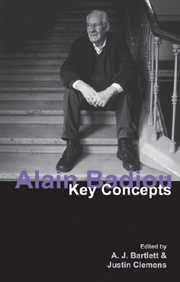Book contents
- Frontmatter
- Contents
- Contributors
- Acknowledgements
- Abbreviations
- Miscellaneous Frontmatter
- Introduction: Badiou's form
- 1 Biography and early works
- PART I THE FOUNDATIONS OF BADIOU'S THOUGHT
- PART II BADIOU'S KEY CONCEPTS OR “CONDITIONS”
- PART III BADIOU'S ENGAGEMENT WITH KEY PHILOSOPHERS
- 10 Plato
- 11 Spinoza
- 12 Kant
- 13 Hegel
- 14 Heidegger
- 15 Lacan
- 16 Deleuze
- 17 New directions
- Afterword: Badiou's futures
- Bibliography
- Index
12 - Kant
from PART III - BADIOU'S ENGAGEMENT WITH KEY PHILOSOPHERS
- Frontmatter
- Contents
- Contributors
- Acknowledgements
- Abbreviations
- Miscellaneous Frontmatter
- Introduction: Badiou's form
- 1 Biography and early works
- PART I THE FOUNDATIONS OF BADIOU'S THOUGHT
- PART II BADIOU'S KEY CONCEPTS OR “CONDITIONS”
- PART III BADIOU'S ENGAGEMENT WITH KEY PHILOSOPHERS
- 10 Plato
- 11 Spinoza
- 12 Kant
- 13 Hegel
- 14 Heidegger
- 15 Lacan
- 16 Deleuze
- 17 New directions
- Afterword: Badiou's futures
- Bibliography
- Index
Summary
Of all the modern philosophers that Badiou engages with, Kant occupies an exceptionally ambiguous position, at once distant and congenial. If on balance Badiou affirms a qualified fidelity to Hegel, his explicit relation to Kant is generally critical, if not dismissive. Badiou's main concern is with what might make the “impossible” possible – with events that cannot occur, with decisions that cannot be resolved and with actions that cannot be carried out or continued within the existing limits of a situation. But in his conventionally “watered-down” form, at least, Kant is precisely the thinker of stifling “limits, rights and unknowables” (LW 8); any “return to Kant” is the symptom of “closed and morbid times” (Badiou 1995: 14). Kant seems to exemplify a tendency to restrict philosophy to scholarly if not idle reflection on the various (logical, linguistic or biological) dimensions of a mere “capacity of cognitive judgement”, on the assumption that the “laws” that limit this capacity are more or less constant (2006i: 21). Badiou has long associated a certain “average Kantianism” with the dominant ideological configuration of the day, a tepid “idealism, centred on Man, and no longer on God: consciousness as the focal point of experience, the subject as guarantee of truth, morality as atemporal formalism” (TS 187).
It is easy, then, to enumerate a series of obvious differences between the two thinkers. Where Badiou himself seeks to affirm the primacy of a “subject without object”, Kant imposes their irreducible correlation. Where Badiou affirms the exceptional and subversive quality of the subject as the local operator of universal truths that exceed demonstration, Kant confirms its transcendental status as an enabling condition of all possible experience.
- Type
- Chapter
- Information
- Alain BadiouKey Concepts, pp. 128 - 136Publisher: Acumen PublishingPrint publication year: 2010
- 1
- Cited by

